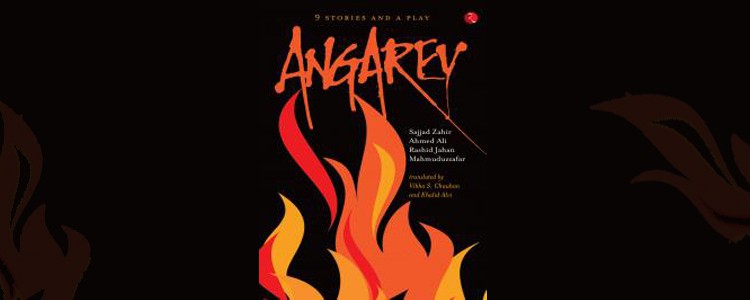Angarey and the Progressive Writers Movement
 This year has been marked by the publication of Rakhshanda Jalil’s thesis by OUP – A Literary History of the Progressive Writer’s Movement in Urdu and two translations of Angarey, first published in 1932 only to be banned. ( Here is a link to the introduction by Snehal Shangvi of the Penguin Books India edition, an extract published in Scroll.in on 15 June 2014: http://scroll.in/article/666833/why-fundamentalists-got-this-urdu-book-banned-when-it-appeared-in-1932/ ) The writers associated with this movement were people who wrote not necessarily for the joy of crafting great literature; they wrote because they saw, and were quick to seize, the great inescapable link between literature and socio-political change. Literature for them was a valuable tool in the cause of nation-building and social transformation. ( Jalil, p. xx) With the publication of Angarey the definition of forward-looking underwent a sea-change and the epithets of irreligious, godless, sacrilegious, even blasphemous, came to be used for a radical, new sort of writing. Many of these writers ( and their readers) were conversant with Western literary styles and English-language authors. It is also important to remember that the glory days of the PWM also spanned the most tumultous period of modern Indian history — Gandhi’s call to Satyagraha, India’s response to the rise of fascism, Nehru’s Muslim mass contact programme, Gandhi’s second civil disobedience movement, the Second World War and its impact on India, the Bengal famine, the rise of Telengana, tebhaga, and other movements, Independence, Partition, and the communal disturbances that scarred the nation. ( Jalil, p. xxviii) Some of the ideas that need to be mentioned regularly are that though Urdu literature was not being written by Muslims along, the great majority of nineteenth-century Urdu writers were indeed Muslims.
This year has been marked by the publication of Rakhshanda Jalil’s thesis by OUP – A Literary History of the Progressive Writer’s Movement in Urdu and two translations of Angarey, first published in 1932 only to be banned. ( Here is a link to the introduction by Snehal Shangvi of the Penguin Books India edition, an extract published in Scroll.in on 15 June 2014: http://scroll.in/article/666833/why-fundamentalists-got-this-urdu-book-banned-when-it-appeared-in-1932/ ) The writers associated with this movement were people who wrote not necessarily for the joy of crafting great literature; they wrote because they saw, and were quick to seize, the great inescapable link between literature and socio-political change. Literature for them was a valuable tool in the cause of nation-building and social transformation. ( Jalil, p. xx) With the publication of Angarey the definition of forward-looking underwent a sea-change and the epithets of irreligious, godless, sacrilegious, even blasphemous, came to be used for a radical, new sort of writing. Many of these writers ( and their readers) were conversant with Western literary styles and English-language authors. It is also important to remember that the glory days of the PWM also spanned the most tumultous period of modern Indian history — Gandhi’s call to Satyagraha, India’s response to the rise of fascism, Nehru’s Muslim mass contact programme, Gandhi’s second civil disobedience movement, the Second World War and its impact on India, the Bengal famine, the rise of Telengana, tebhaga, and other movements, Independence, Partition, and the communal disturbances that scarred the nation. ( Jalil, p. xxviii) Some of the ideas that need to be mentioned regularly are that though Urdu literature was not being written by Muslims along, the great majority of nineteenth-century Urdu writers were indeed Muslims.
Here is a list of the major writers and poets associated with the Progressive Writers’ Movement ( as listed in Dr Jalil’s thesis, Annexure I)
Abdul Alim, Abdul Haq, Ahmad Nadeem Qasmi, Ahmed Ali, Akhtar Husain Raipuri, Akhtarul Iman, Ale Ahmad Suroor, Ali Sardar Jafri, Asrarul Haq Majaz ( his nephew is the poet and lyricist, Javed Akhtar), Ehtesham Husain, Faiz Ahmed Faiz, Fikr Taunsvi, Firaq Gorakhpuri, Hajra Begum, Hasrat Mohani, Hayatullah Ansari, Ibrahim Jalees, Ismat Chugtai, Jan Nisar Akhtar, Josh Maliabadi, K.M.Ashraf, Kaifi Azmi, Kanhaiyyalal Kapoor, Khawaja Ahmad Abbas, Krishan Chandar, Mahmuduzzafar Khan, Majnun Gorakhpuri, Majrooh Sultanpuri, Makhdoom Mohiuddin, Moin Ahsan Jazbi, Mulk Raj Anand, Mumtaz Husain, Mohammad Hasan, Niyaz Haider, Premchand, Qateel Shifai, Rajinder Singh Bedi, Rashid Jehan, Razia Sajjad Zaheer, Rifat Sarosh, Saadat Hasan Manto, Sagar Nizami, Sahir Ludhianvi, Sajjad Zaheer, Salam Machchlishahri, Sibte Hasan, Syed Muttalibi Faridabadi, Upnedranath Ashk, Wamiq Jaunpuri and Zaheer Kashmiri.
Both the translations published in April 2014 are readable. Fortunately these now exist and are readily available, a delightful  bouquet of riches for readers. Yet there is a vast difference in the quality of translations, and would be of valuable to interest to translators and academics. The notes on translations by Snehal Shangvi, Khalid Alvi and Vibha S. Chauhan are worth reading.
bouquet of riches for readers. Yet there is a vast difference in the quality of translations, and would be of valuable to interest to translators and academics. The notes on translations by Snehal Shangvi, Khalid Alvi and Vibha S. Chauhan are worth reading.
These are books that will be treasured and should find a place in every library, institution and be read by many.
The only question that I wonder about is how much were these writers influenced by the Irish literary movement of the early twentieth century?
Rakhshanda Jalil A Literary History of the Progressive Writer’s Movement in Urdu Oxford University Press, New Delhi, 2014. Hb. pp. 490. Rs. 1495
Angarey translated from the Urdu by Vibha S. Chauhan and Khalid Alvi. Rupa Publications, New Delhi, 2014. Pb. pp. 105. Rs. 195
Angaarey translated by Snehal Shangvi. Penguin Books India, New Delhi, 2014. Hb. pp. 170. Rs. 499

